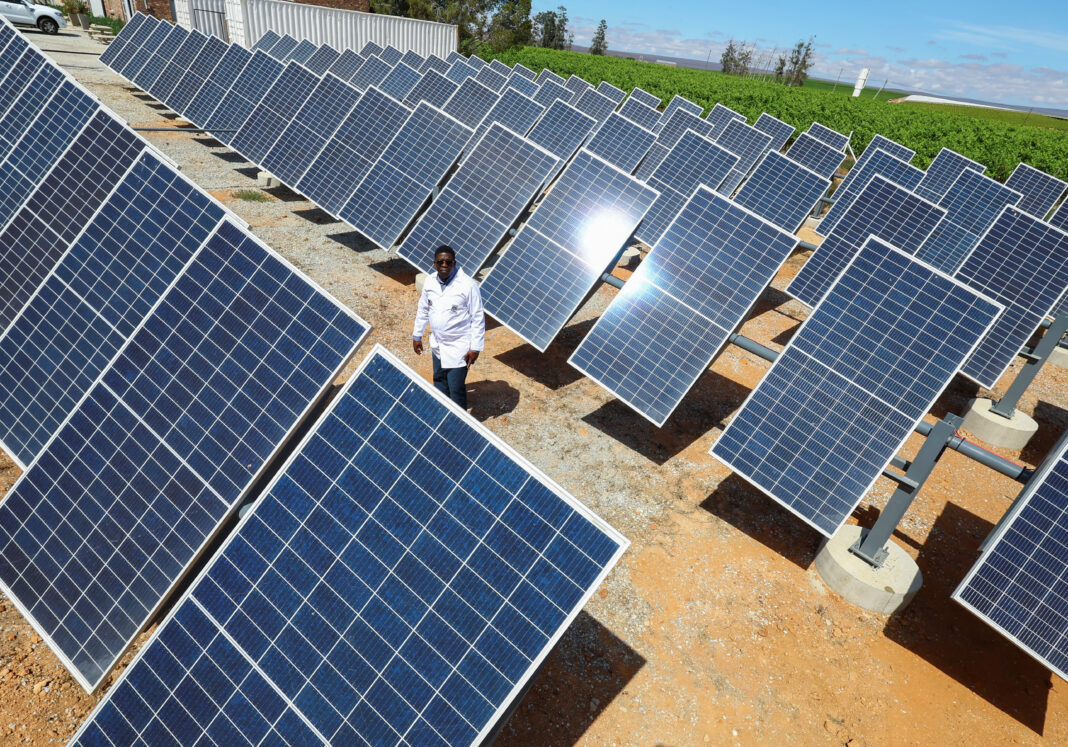What could be the best energy source in the near future? Which technology do we need? How to combat climate change? And how are we going to contain global warming? Questions to the International Solar Alliance‘s Director General, Dr Ajay Mathur.
Director Ajay Mathur, what are the mission and objectives of the International Solar Alliance (ISA)?
The International Solar Alliance (ISA) is an action-oriented, member-driven, collaborative platform for increased deployment of solar energy technologies to bring energy access, ensure energy security, and drive energy transition in its Member Countries.
ISA is guided by its ‘Towards 1000’ strategy, which aims to mobilize USD 1,000 billion of investments in solar energy solutions by 2030 while delivering energy access to 1,000 million people using clean energy solutions and resulting in the installation of 1,000 GW of solar energy capacity. This would help mitigate global solar emissions to the tune of 1,000 million tonnes of CO2 annually.
How did the ISA project start, and how many signatory Countries?
ISA was conceived as a joint effort by India and France to mobilize efforts against climate change by deploying solar energy solutions. It was conceptualized on the sidelines of the 21st Conference of Parties (COP21) to the United Nations Framework Convention on Climate Change (UNFCCC) held in Paris in 2015. With the amendment of its Framework Agreement in 2020, all member states of the United Nations are eligible to join ISA. 114 countries are signatories to the ISA Framework Agreement, of which 92 have submitted the necessary instruments of ratification to become full members of the ISA.
What link does ISA have with the G20?
ISA is an international organization partner to the 2023 G20 Presidency and has been working with both G20 and non-G20 countries to understand how solar electricity and solar hydrogen (hydrogen produced by the electrolysis of water using solar electricity) can help meet energy needs. It is now evident that meeting the ever-growing energy demands will require several industrial sectors, including steel and petrochemicals, to start using hydrogen; leapfrog technologically in the production of hydrogen through electrolysis and solar electricity; promote production in regions of the world where there is both demand and high solar insolation; and accelerate global trade in solar hydrogen through, for example, harmonization of “green-ness” requirements. ISA would like the G20 to promote the utilization and production of solar hydrogen and its increased global trade. The ISA stands ready to continue to support the G20 in this process by tracking global progress in the utilization and production of, and trade in, solar hydrogen.
ISA’s projects in many developing countries, especially those in Africa, have shown that solar mini-grids with storage, typically as batteries, are the best way to provide rural electricity access, especially in areas with poor grid coverage. The cost of grid construction, or diesel imports, now far outweighs the cost of providing electricity through decentralized solar mini-grids.
We have been and will continue to support regulatory regimes that bring in investments and strengthen institutional and human capacity, especially for women. However, investments are not flowing into these regions, and additionally, the price of solar panels is still growing but increasing globally. Consequently, ISA is developing a risk management facility to provide confidence to investors; and will provide policy and technical assistance to countries in developing resilient supply chains among both startups and established companies.
ISA would like the G20 to enable global investment in solar mini-grids by unlocking the risks to investment flows, and also promoting the geographical diversification of manufacturing. ISA stands ready to support G20 in global action in enabling solar mini-grids, and facilitating public policies to promote manufacturing across countries.
Ultimately, promoting solar requires start-ups ready to absorb technology and finance and deliver solar services, such as electricity, solar panels, inverters and so on. This requires the start-ups to be trained in managing solar supply chains, making themselves attractive to investment, and developing the brand advantages necessary to grow markets. ISA, together with Invest India and organizations involved in African solar technology and infrastructure projects and in global project finance, has launched a pan-Africa SolarX Grand Challenge to identify 20 African start-ups, with at least half of them being women led, and then move them through bootstrapping camps related to technology, finance and brand management. In future years, building on the learnings from this first SolarX Grand Challenge, ISA plans to expand it to cover the Asia & Pacific region and the Latin America & Caribbean region. ISA stands ready to work with the G-20 so that they gain international recognition in addition to financial, technical and capacity-building support.
What is for you the best way, also in terms of technology, to tackle climate change?
Solar is a shared solution that simultaneously addresses climate, energy and economic priorities across geographies. Through collaborative efforts, efficiency and electrification enabled by renewable power, green hydrogen can be the primary driver to tackle climate change. The world must push for renewables as multiplier solutions, available today for a rapid scale-up with grid and off-gride-networks. The latest strides in battery storage technology, the new emerging fuel in the form of green hydrogen, and efforts made globally to diversify supply chains will lead to new wins in tackling climate change.
Through solid partnerships and international cooperation the world can effectively contribute to the global net-zero ambition and keep development high on the agenda. A new multilateral compact among nations, global finance, and the private sector is needed to deliver systemic change and advance the renewable-centred energy system with opportunities for developed and developing countries. ISA is leading the work in bringing different stakeholders together to find solutions.
Which countries are affected by project activities?
To meet its goals, the ISA takes a programmatic approach. Currently, the ISA has nine comprehensive programs, each focusing on a particular application that could help scale the deployment of solar energy solutions. Activities under the programs focus on the following priority areas – analytics & advocacy, capacity building, programmatic support, and readiness and enabling activities, that help create a favourable environment for solar energy investments to take root in a Member Country. ISA extends support to Least Developed Countries (LDCs) and Small Island Developing States (SIDS) by providing grants to Member Countries for technical and financial assistance in setting up solar pilot projects. The grant initiative allows eligible Member Countries to access up to USD 50,000 by submitting project proposals across various solarization themes such as Primary Health Care Solarization, Solar Water Pumping Systems, Solar Cold Storage, and other innovative projects.
As of August 2022, 27 countries have expressed interest, and the Detailed Project Reports of 26 countries have been finalized. Currently, projects are on in Benin, Burkina Faso, Burundi, Cambodia, Comoros, Cuba, Djibouti, Ethiopia, Fiji, Guyana, Jamaica, Kiribati, Malawi, Mali, Mauritius, Mozambique, Niger, Samoa, Senegal, Seychelles, Sudan, Suriname, The Gambia, Togo, Tonga, Uganda.
At COP27, it has been confirmed that the objective is to contain global warming to 1,5° C compared with pre-industrial levels: are you optimistic about this?
All of us should be optimistic about it because our survival depends on achieving this feat. In 2022, despite headwinds, most of the world showed a clear path forward in cutting emissions. Yet, to meet the world’s ambitious climate targets, the past year generated some new obstacles: the energy crisis, manufacturing issues, and supply chain tensions in solar panels. However, the momentum, especially in solar, has been significant.
The sine qua non of all our activities and efforts at ISA are geared to steer an energy transition which will help deplete carbon emissions. At COP27, ISA hosted its first pavilion and highlighted its achievements through its ongoing Demonstration Projects in the LDCs and SIDS. These projects demonstrate locally relevant and required solar-powered solutions that, if successfully scaled, could help countries meet their climate goals.
As mentioned above, ISA also launched unique initiatives at COP27 to further boost energy transition. The SolarX Grand Challenge is ISA’s exclusive call out to cleantech entrepreneurs. Climate tech can be influential and help create resilient communities if solutions are localized, meaning they address and adapt to local needs and context. One way to ensure this is by fostering locally grown solutions, which can spill over boundaries and geographies. Through the SolarX Grand Challenge, ISA will enable the tools and capital required by innovators and entrepreneurs in the developing parts of the world to innovate for themselves and scale it up and beyond. We are focussing this year on the Africa region and hope to cover other geographies in the future.
Similarly, to address barriers limiting private sector capital flowing at scale into developing and emerging countries to achieve climate change mitigation and renewable energy deployment. ISA conceived the Solar Finance Facility – a blended finance facility comprising risk mitigation instruments, such as a payment guarantee mechanism and an insurance support mechanism. These mechanisms would be instrumental in speeding up development and mobilizing investments in a Member Country by absorbing the project risks from the developers and protecting them against unforeseen challenges.
The International Solar Alliance (ISA) is an action-oriented, member-driven, collaborative platform for increased deployment of solar energy technologies to bring energy access, ensure energy security, and drive energy transition in its Member Countries.
ISA is guided by its ‘Towards 1000’ strategy, which aims to mobilize USD 1,000 billion of investments in solar energy solutions by 2030 while delivering energy access to 1,000 million people using clean energy solutions and resulting in the installation of 1,000 GW of solar energy capacity. This would help mitigate global solar emissions to the tune of 1,000 million tonnes of CO2 annually.





